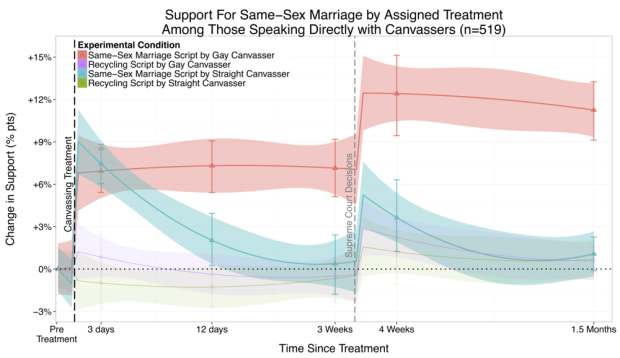Last week, graduate student Michael J. LaCour was in the news for allegedly making up data. The results were published in Science. LaCour's co-author Donald Green requested a retraction, but the paper stayed while the request was considered. Today, Science formally fulfilled the request.
The reasons for retracting the paper are as follows: (i) Survey incentives were misrepresented. To encourage participation in the survey, respondents were claimed to have been given cash payments to enroll, to refer family and friends, and to complete multiple surveys. In correspondence received from Michael J. LaCour's attorney, he confirmed that no such payments were made. (ii) The statement on sponsorship was false. In the Report, LaCour acknowledged funding from the Williams Institute, the Ford Foundation, and the Evelyn and Walter Haas Jr. Fund. Per correspondence from LaCour's attorney, this statement was not true.
This is like a car accident I can't look away from, and it continues to get worse. Virginia Hughes for BuzzFeed reported a discrepancy in LaCour's listed funding sources, as noted in the Science retraction.
In the study's acknowledgements, LaCour states that he received funding from three organizations — the Ford Foundation, Williams Institute at UCLA, and the Evelyn and Walter Haas, Jr., Fund. But when contacted by BuzzFeed News, all three funders denied having any involvement with LaCour and his work.
Then Jesse Singal for Science of Us looked closer at LaCour's CV and it appears he made up his largest funding source.
The largest of these is a $160,000 grant in 2014 from the Jay and Rose Phillips Family Foundation of Minnesota. But Patrick J. Troska, executive director of the foundation, which is focused on projects that combat discrimination, wrote in an email to Science of Us, "The Foundation did not provide a grant of any size to Mr. LaCour for this research. We did not make a grant of $160,000 to him."
Just yesterday, Singal reported another discrepancy in LaCour's CV: A made up teaching award. When Singal asked LaCour about it, LaCour removed it from the CV, posted a new file to his site, and said he didn't know what Singal was talking about. The original CV was still cached on the UCLA server. Oof.
People have also started to examine LaCour's previous work, and it's not looking good.
Since this whole thing started, LaCour has stayed mostly quiet on the advice of his lawyer and says he will have a "definitive response" on or before May 29, 2015. That's tomorrow. And so I wait, unable to look away.
As a former graduate student, I keep trying to put myself in a similar situation. It's crazy. I want LaCour to drop down a response — a giant stack of papers, pages and pages long — raise his hands in the air, and just disprove everything. But it doesn't look like that's going to happen.
Tags: fake data, retraction

